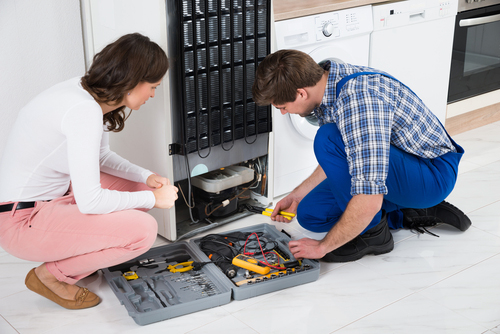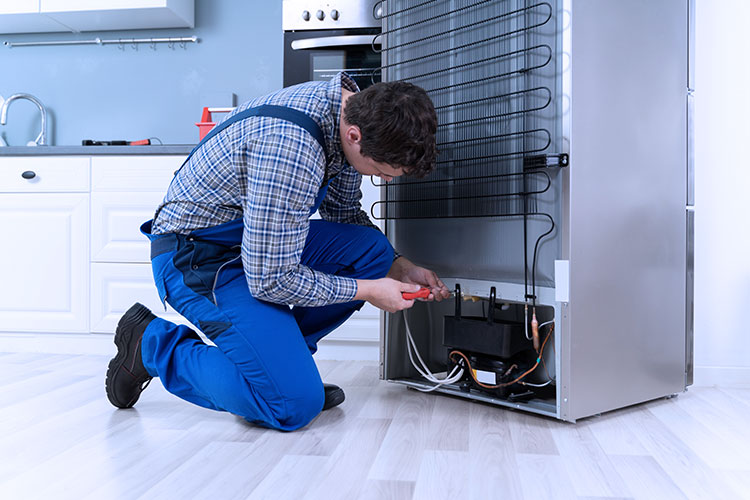Quick Guide from Refrigerator repair experts Dependable Refrigeration & Appliance Repair: What to Check Before Calling a Tech
Quick Guide from Refrigerator repair experts Dependable Refrigeration & Appliance Repair: What to Check Before Calling a Tech
Blog Article
Necessary Tips for Effective Ref Repair to Extend Appliance Lifespan
When it involves your refrigerator, correct fixing and upkeep are important for longevity. You may not realize how tiny issues can escalate if they're left unaddressed. Regular examinations and basic solutions can save you from costly replacements down the line. Comprehending common troubles and recognizing when to act can make all the difference. Allow's explore some vital tips that will certainly aid you keep your fridge running efficiently for several years to find.
Comprehending Typical Fridge Troubles
Refrigerators are necessary in maintaining your food fresh, yet they can experience a series of common problems that interrupt their performance. One constant problem is insufficient air conditioning. If you see food spoiling quicker than normal, examine the thermostat settings or consider if the door seals are damaged. One more usual trouble is extreme sound, which could show a malfunctioning compressor or a failing follower. You could additionally experience water merging inside or beneath the refrigerator; this often arises from a clogged up defrost drain or a defective water line. Additionally, if your fridge's light isn't working, maybe a straightforward light bulb issue or a problem with the door button. Finally, ice accumulation in the fridge freezer can prevent airflow and cooling down efficiency. Recognizing these issues early can conserve you money and time out of commission, guaranteeing your refrigerator runs efficiently and efficiently.
Normal Upkeep Practices
To maintain your devices running smoothly, you need to remain on top of normal maintenance methods. Tidy the condenser coils, examine the door seals, and keep track of the temperature level setups to guarantee peak efficiency. These basic tasks can conserve you time and money on repairs down the line.
Clean Condenser Coils Routinely
Cleaning your condenser coils frequently can substantially improve your device's performance. Dust and dirt accumulate on these coils with time, causing your appliance to work more challenging and take in more energy. To maintain them clean, disconnect your device and very carefully get rid of any type of protective covers. Use a vacuum cleaner with a brush accessory or a soft brush to delicately eliminate debris. If needed, a combination of warm water and moderate detergent can aid eliminate persistent crud. Make certain to allow whatever completely dry completely prior to rebuilding and connecting the home appliance back in. Purpose to clean your coils at the very least two times a year, or a lot more commonly if you have family pets or live in a messy atmosphere. This easy task can expand the life expectancy of your home appliance substantially.
Check Door Seals
3 basic steps can help you guarantee your device's door seals remain in excellent condition. First, inspect the seals consistently for any type of cracks, splits, or indications of wear. These problems can bring about air leaks, impacting effectiveness. 2nd, clean the seals utilizing cozy, soapy water to get rid of any kind of debris or gunk. A clean seal ensures a tight fit and far better efficiency. Finally, carry out a straightforward test by closing the door on a paper. If you can conveniently pull it out without resistance, the seal may need replacing. By adhering to these steps, you'll maintain your home appliance's performance and durability, saving you money on power bills and repair work in the lengthy run.
Monitor Temperature Settings
Regularly checking your home appliance's temperature settings is important for best performance and effectiveness. Whether you're managing a fridge, fridge freezer, or stove, keeping an eye on these settings can protect against numerous problems. For refrigerators, go for temperature levels between 35 ° F and 38 ° F; for freezers, stick around 0 ° F. If the temperature levels are expensive or reduced, your home appliance might function harder, losing power and shortening its life-span. Use a thermostat to inspect these setups consistently, specifically after major adjustments, like relocating your device or adjusting the thermostat. If you see fluctuations, readjust the setups accordingly and seek advice from the user handbook for guidance. By staying positive concerning temperature level monitoring, you'll ensure your devices run efficiently and last much longer.
Repairing Air Conditioning Issues
When your refrigerator isn't cooling properly, it can result in ruined food and threw away money, so resolving the problem without delay is crucial. Start by examining the temperature settings to verify they're at the site web advised levels, usually around 37 ° F for the refrigerator and 0 ° F for the fridge freezer. If the settings are correct, evaluate the door seals for any voids or damage; a malfunctioning seal can permit cozy air to website here enter.
Following, take a look at the vents inside the fridge and fridge freezer. Confirm they're not blocked by food items, as this can disrupt air movement. Pay attention for the compressor; if it's not running or making unusual noises, it might require attention. Check the condenser coils, usually located at the back or base of the unit. Dust and debris can gather, causing cooling issues. Clean them with a vacuum cleaner or brush to optimize efficiency. If issues continue, it may be time to call a professional.
Repairing Water Leakage and Ice Build-Up
If you're handling water leak or ice accumulation in your device, it's important to determine the resource of the problem. By identifying where the water is coming from, you can prevent more concerns and stay clear of pricey repair services. Let's discover some reliable methods to tackle these common problems.
Determine Leakage Resources
How can you effectively recognize the sources of water leakage and ice accumulation in your home appliances? Beginning by evaluating the seals and gaskets on your fridge and freezer doors. A worn or damaged seal can permit cozy air to go into, creating condensation and ice. Next, check the drain frying pan and water drainage system for obstructions or obstructions; a backed-up drainpipe can bring about water merging. Look for any type of loose links in the water system line, which can create leakages. Also, analyze the defrost drainpipe for ice buildup, which could interrupt correct drain. By methodically examining these locations, you'll identify the source of the issue, allowing you to take the required actions to fix it and prolong your home appliance's lifespan.
Avoid Ice Development
To stop ice formation in your devices, begin by validating the temperature level settings are appropriate. If your fridge or fridge freezer is also cold, it can lead to excessive ice build-up. Inspect the door seals routinely; damaged seals can allow warm air in, causing condensation and ice formation.
Maintain the appliance well-ventilated and prevent congestion, as this can block air flow - Washing Machine Repair Dependable Refrigeration & Appliance Repair Service. Additionally, consistently thaw your freezer if it does not have an automatic defrost feature.
If you discover water leak, identify and fix any type of blocked drainage holes, as they can contribute to ice accumulation. Lastly, clean the coils and validate they're functioning correctly to keep peak efficiency. Taking these steps will certainly help prolong your device's life expectancy and effectiveness.
Attending To Noisy Refrigerator Seems
While it might seem alarming, a loud refrigerator commonly indicates small issues instead of significant malfunctions. First, identify the resource of the sound. Typical wrongdoers include the compressor, fans, and water lines. If you hear a humming sound, it may be the compressor striving; this can simply be a regular operation sound.
Next, check for loosened things inside. Occasionally, containers or shelves can rattle, developing unwanted noise. Tighten or reposition them to get rid of the sounds.
If you discover a clicking noise, it may look at more info be the defrost timer. This is generally safe yet can indicate it requires evaluation.
Lastly, verify your refrigerator is degree. An out of balance home appliance can create vibrations and noise. Utilize a level to check, and readjust the feet if needed. Resolving these concerns quickly can assist maintain your fridge's efficiency and prolong its life expectancy.
When to Change Components vs. Complete Replacement

Take into consideration the expense of repair services versus the device's worth. Furthermore, if you observe ongoing troubles that keep repeating, it's a sign that your device has gotten to the end of its life.
Understanding When to Call an Expert
Just how can you tell when it's time to contact a professional for appliance repair? If you see uncommon noises, smells, or leakages, it's a clear signal that something's wrong. Don't neglect these indications; they often suggest deeper issues. If your device quits functioning entirely or frequently journeys circuit breakers, it's another warning.
You must also consider your own comfort level with repairs. If you're not sure concerning identifying the issue or lack the right tools, it's finest to reach out for help. Keep in mind, trying difficult fixings can lead to even more damages and even safety threats.

Often Asked Questions
Exactly how Usually Should I Clean the Fridge Coils?
You must cleanse your fridge coils every six months. This aids keep efficiency and protects against overheating. If you see extreme dust or family pet hair, tidy them more regularly to assure your refrigerator runs smoothly.

Can I Use Vinegar for Cleaning My Fridge?
Yes, you can use vinegar to clean your refrigerator! It's a superb natural cleaner that eliminates odors and spots. Dependable Refrigeration & Appliance Repair Service, Oro Valley, AZ 85755. Just mix it with water, apply it to surfaces, and wipe down for a fresh, tidy refrigerator
What Temperature level Should My Refrigerator Be Set To?
You need to establish your fridge to 37 ° F(3 ° C) for perfect food preservation. This temperature keeps your food fresh while preventing spoilage, guaranteeing your groceries last longer and reducing waste. It's a very easy change you can make!
Does a Refrigerator Required to Be Leveled?
Yes, your refrigerator requires to be leveled. If it's unequal, it can impact cooling down performance and create excess sound. Inspect the leveling legs and readjust them to guarantee correct balance for ideal performance.
Just How Can I Reduce Fridge Energy Usage?
To reduce your refrigerator's power usage, keep it tidy and well-ventilated, inspect door seals for leaks, set the temperature in between 35-38 ° F, and stay clear of overwhelming it. These steps can considerably reduce your power costs.
Report this page